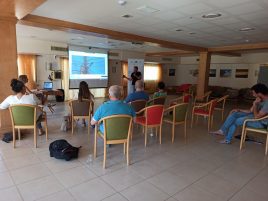
During their visit to the Hevel Eilot region the partners from the Spanish Chamber of Commerce, Capenergies, Kinneret College, and the Arava Institute had an opportunity to explore local tourism establishments and sustainability initiatives:
- At Kibbutz Lotan’s Center for Creative Ecology, participants discovered low-tech green building methods and solutions for water and energy efficiency, such as biogas digesters, straw bale mud-building, and solar ovens and stoves. They also discussed the integration of small-scale tourism businesses into local communities.
- The Neot Smadar Guest House presented a unique view on eco- tourism in the desert, leading to a discussion on the over-all sustainability of tourism in general. As Gadi Beilis, the establishment’s manager, put it: “People leave the homes they already have, to go to a place far away – probably with a polluting vehicle – to stay in an otherwise unused building and eat somebody else’s food, use somebody else’s water, electricity, supplies, and equipment. There is nothing environmentally friendly about this.” The group also visited the Neot Smadar Art Center, and learned about the Kibbutz’ approach to communal living.
- After these two small-scale guesthouses, the Six Senses Shaharut provided a completely different perspective. This luxury hotel’s mission is to provide tourists with a high-end comfortable stay in a very remote location, while keeping its negative environmental impact to a minimum. The first Israeli hotel to receive the LEED Certification from the US Green Building Council, it relies on treating its own wastewater, a solar power plant, smart energy and water efficient technologies, various green building methods, and a general attention to sustainable use of the naturally present resources of the area.
- At Kibbutz Ketura the team visited Israel’s first solar field, and the Off-grid Technology Demonstration Village at the Arava Institute, an exhibition and active testing ground for new developments that provide off-grid solutions to energy needs in communities, making some of them very relevant as an option for more energy efficiency in hotels as well.
The visit also included two public transboundary workshops on Innovative Energy and Water Management Solutions for the Tourism Industry. The workshops were each attended by approximately 20 stakeholders, experts, and researchers, and were also broadcast live on Facebook.
May 23rd’s workshop, focusing on energy management solutions, included an overview of the GREENinMED program and the opportunities it offers; a presentation of the tourism industry in the Hevel Eilot region with a special emphasis on the many efforts made towards sustainable solutions; and a unique contribution by Dr. Rina Kedem, Co-Director of the Arava Institute’s Jordan-Israel Center for Community, Environment, and Research, about transboundary tourism in the Arava, Negev, and Sinai desert regions. On the more technical side, Israeli green building consultant Hadas Peer shared her insights on green building standards and certification in Israel and the world; Harold Wiener, founder of Terra Venture Partners, presented some of their available green energy solutions; and Arava Institute alum Elad Topel, Coordinator of the Eilat Smart City project, spoke about technologies and solutions for energy and water management as they are being applied in the city of Eilat.
The following day’s workshop focused on water management solutions, including a presentation by Six Senses Shaharut Sustainability Manager Liraz Amer who spoke about the solutions implemented in the hotel, and an in- depth introduction to one of those technologies: a small-scale wastewater treatment plant developed by Aqwise. Rosa Nieto from Cenergist presented some of the company’s smart water saving solutions for hotels, such as a stream-regulating attachment for faucets. A more academic approach was offered by researcher Dr. Yoram Ben Ari who shared the findings of his doctoral work on The impact of climate change on tourism infrastructures in Israel.

